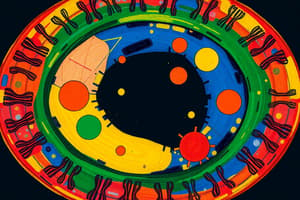Podcast
Questions and Answers
What is the main function of chromosomes in the cell?
What is the main function of chromosomes in the cell?
- To facilitate cell division and reproduction (correct)
- To regulate cell growth and development
- To produce proteins and enzymes
- To store genetic information
Where are chromosomes located within the cell?
Where are chromosomes located within the cell?
- In the nucleus (correct)
- In the mitochondria
- In the cell membrane
- In the cytoplasm
What is the role of genes in the cell?
What is the role of genes in the cell?
- To regulate protein synthesis and metabolism
- To provide instructions for producing specific body features (correct)
- To replicate DNA during cell division
- To maintain cell membrane structure and function
What is the result of the cell cycle?
What is the result of the cell cycle?
What is the purpose of DNA replication during cell division?
What is the purpose of DNA replication during cell division?
When are chromosomes visible under a microscope?
When are chromosomes visible under a microscope?
What is the primary purpose of Mitosis?
What is the primary purpose of Mitosis?
What is the stage of the cell cycle where DNA synthesis takes place?
What is the stage of the cell cycle where DNA synthesis takes place?
What is the total number of chromosomes in humans?
What is the total number of chromosomes in humans?
What are the thread-like structures that carry genetic information in the nucleus of living cells?
What are the thread-like structures that carry genetic information in the nucleus of living cells?
What is the type of cell division that occurs in reproductive cells?
What is the type of cell division that occurs in reproductive cells?
Study Notes
Cellular Structure
- Cells are the smallest, fundamental unit of life, containing nucleus at the center.
- Inside the cell, structures called chromosomes can be found where DNA is located.
- These chromosomes reside inside the nucleus of the cell.
- Within the nucleus, chromatin structures are present which eventually form chromosomes during cell division.
- Chromosomes are visible under a microscope when the cell is dividing.
Chromosomes
- Chromosomes are crucial for cell division and reproduction.
- The chromosome structure becomes visible during cell division where they condense, combine, and form a substance known as chromatin.
- Chromosomes serve an important role for students intending to study biology or become medical practitioners.
- Chromosomes have important connections to genes and DNA.
DNA and Genes
- DNA composes chromosomes and contains genes, making up a sequence of nucleotides.
- Genes are sequences of nucleotides within DNA that contain the instructions for producing specific body features.
- Genes transfer from parents to offspring, dictating specific traits and features.
- Genes respond for growth and development of body features.
- DNA replication is necessary for cell division, allowing cells to divide and multiply.
Cell Cycle
- The cell cycle involves a series of events such as cell division and cell growth.
- During the cell cycle, DNA replicates and cells multiply, aiding in body growth.
- The cell cycle results in the production of new cells.
- It is a crucial process for body repair, growth, and development.
- The cell cycle includes various stages such as interphase and formation of new chromosomes.
- DNA undergoes synthesis in the interphase of the cell cycle.Here are the study notes on the topic of Mitosis, Cell Division, and Chromosomes:
Mitosis
- Definition: A type of cell division that results in two daughter cells that are genetically identical to the parent cell.
- Purpose: To produce more cells for growth, repair, and replacement of old or damaged cells.
Cell Division
- Types: Mitosis (somatic cells) and Meiosis (reproductive cells).
- Stages: Interphase, Prophase, Metaphase, Anaphase, Telophase, and Cytokinesis.
Chromosomes
- Definition: Thread-like structures that carry genetic information in the nucleus of living cells.
- Number: 23 pairs of chromosomes in humans (46 total).
Studying That Suits You
Use AI to generate personalized quizzes and flashcards to suit your learning preferences.
Description
Test your knowledge of cellular structure, chromosomes, DNA, genes, and the cell cycle. Learn about the process of mitosis, cell division, and the importance of chromosomes in biology.




